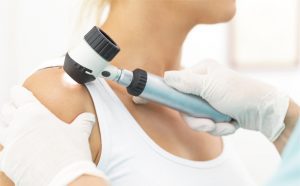By Joseph Onorato, MD, FAAD
 Cancer can occur anywhere in the body. It has many forms and many names. It sometimes presents itself by showing symptoms that are easily recognizable, at other times it can remain hidden for years. That is why it is important to visit your doctor regularly and talk to him/her about any changes you may have noticed in your body.
Cancer can occur anywhere in the body. It has many forms and many names. It sometimes presents itself by showing symptoms that are easily recognizable, at other times it can remain hidden for years. That is why it is important to visit your doctor regularly and talk to him/her about any changes you may have noticed in your body.
The most common form of cancer in America is skin cancer. Each year as many as 9,500 people are diagnosed with skin cancer of one form or another in the US. Other interesting facts include:
• 1 in 5 Americans will develop skin cancer by the age of 70.
• More than 2 people die of skin cancer in the U.S. every hour.
• Having 5 or more sunburns doubles your risk for melanoma.
• When detected early, the 5-year survival rate for melanoma is 99 percent. (1)
Who is most at risk for skin cancer?
According to the CDC, those who are at the highest risk for developing skin cancer are people who have:
• A lighter natural skin color.
• Skin that burns, freckles, reddens easily, or becomes painful in the sun.
• Blue or green eyes.
• Blond or red hair.
• Certain types and a large number of moles.
• A family history of skin cancer.
• A personal history of skin cancer.
• Older age.
How can I prevent skin cancer?
Most skin cancers are the direct result of too much exposure to ultraviolet light. UV rays come from the sun, but also from tanning beds and other types of sun lamps. These UV rays damage skin cells and should be avoided. When you are unable to avoid them, caution and protection should be used. This is true all year round, not just on sunny, summer days.
Seeking shade is a good way to reduce your exposure to UV rays. Sitting under a tree, an umbrella, or a shelter is a good plan, however, it isn’t enough. Even in the shade sunscreen, protective clothing, and hats are your best defense against these harmful rays.
Using a broad-spectrum sunscreen is essential when spending time in the outdoors. Sunscreens should have a sun protection factor (SPF) of at least 15 and should be reapplied regularly. It should be applied every 2 hours and after getting wet or sweating. It is also important to remember that it has a shelf-life of no more than 3 years.
Skin cancer screening
Patients should regularly check their skin for signs of skin cancer. When looking at a spot, there are certain things to look for. The ABCDEs of melanoma is helpful.
• Asymmetry
• Border
• Color
• Diameter
• Evolving
If you notice any of the above, a skin cancer screening with a dermatologist should be carried out. A skin cancer screening is an in-office procedure in which a doctor conducts a visual examination of a patient’s skin looking for signs of cancer (ABCDE). During the examination, the areas that should receive the most attention are moles, birthmarks, and “sun spots”. The size, shape, texture, and color are all important aspects to be examined closely. The goal is to detect cancer from the earliest possible moment to ensure timely treatment. If a spot is determined to be “suspicious”, the doctor will used specialized tools to have a closer look and may need to take a sample to be sent to a laboratory for a biopsy.
SWFL Dermatology Plastic Surgery & Laser Center is a full-service General and Surgical Dermatology practice and a leader in Non-Invasive Anti-Aging & Beauty Enhancement Cosmetic Services.
The staff at SWFL Dermatology Plastic Surgery & Laser Center is dedicated to providing the most personalized care by treating their patients like family. Each provider is committed to taking the time to understand the concerns and goals of the patient in order to provide the best-individualized care for that patient.
The expert and dedicated team offers specialized and individualized treatment options for skin conditions such as acne, alopecia, contact dermatitis, eczema, rosacea, shingles, sunburn, and urticaria.
SWFL Dermatology is an extension of All Island Dermatology Plastic Surgery, MedSpa and Laser Center which has serviced patients in the greater Garden City and Glen Cove communities in Long Island, New York since 1995.
The office is conveniently located at 13800 Tamiami Trail N, Naples, Florida, and serves the greater Collier and Lee County areas.
To improve the appearance and health of your skin, schedule a consultation today at SWFL Dermatology Plastic Surgery & Laser Center online or by phone at 239-500-SKIN.
What’s on YOUR Skin?
SWFL Dermatology
SWFLDermatology.com
13800 Tamiami Trail N, Suite 112
Naples, FL 34110









